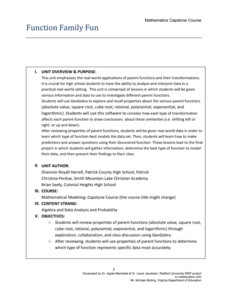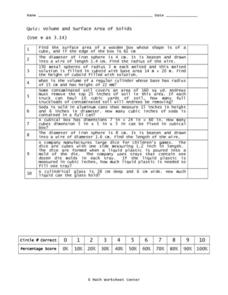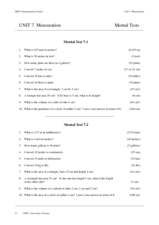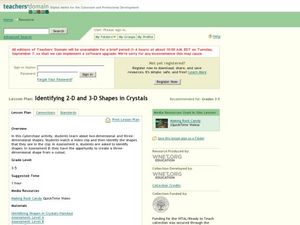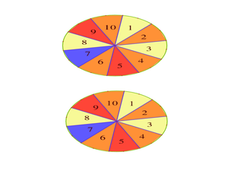Corbett Maths
Direct Proportion
Direct change by finding the constant. Using two known values within a direct proportion, the resource shows how to find the constant of proportionality. Once individuals do that, they then find any value given the other. The video works...
Radford University
Function Family Fun
It's time for a family reunion—function families, that is. Pupils first review different types of parent functions. They then see how to apply transformations to graphs and learn how to select the most appropriate type of function to...
Curated OER
Connecting cube Structures
In this cube structure worksheet, students use connecting cubes to build structures shown in pictures. One picture is shown from 2 different angles.
Curated OER
Cups and Cubes
Third graders explore the use of cups and counters as a model to analyze the effects of operations. They create and use a rule to create a sequential pattern and use cups and cubes to model the relationship.
Curated OER
Candy Bar Math Fun!
Students practice math. In this measurement instructional activity, students measure their favorite candy bars to the nearest inch. They work independently to compare the different lengths of the candy bars they measure.
Curated OER
Multiplication Strategies and Writing Story Problems
Third graders model multiplication problems using Unifix cubes. They compute and solve problems involving addition and subtraction of 3- and 4- digit numbers and basic facts of multiplication and division. They practice mental math...
Curated OER
Volume
In this volume worksheet, 8th graders solve and complete 6 different short answer questions and problems that relate to volume. First, they determine the number of cubes found altogether that has a given length, width and height. Then,...
Curated OER
Volume and Surface Area of Solids
In this solids worksheet, 10th graders solve and complete 10 different word problems that include determining the volume and surface area of various solids. First, they determine the surface area of a cube as described. Then, students...
Curated OER
Regrouping
Young scholars practice regrouping using the wonderful manipulative - unifix cubes. Once they have a tactile understanding of regrouping, students complete 5 worksheets containing addition problems that require regrouping. The worksheets...
Curated OER
Part Part Whole
First graders solve number sentences. In this problem solving lesson, 1st graders construct addition sentences using a part part whole mat. Students demonstrate problem solving strategies using cubes.
Curated OER
Volumes
In this volume instructional activity, 6th graders solve 5 different problems related to determining the volume of various objects. They determine the volume of a rectangular prism, a cone, a cube, a pyramid, and a cylinder.
Curated OER
Measurement Mania
First graders measure 10 different objects found in the classroom, including their own hands and feet, then record their findings. This is a fun lesson for students to experience measurement using a ruler and unifix cubes.
Curated OER
Revise Identifying 3-D Shapes
For this 3-D shapes worksheet, students practice identifying 8 3-D shapes with their following precise names: cube, cuboid, square based pyramid, cone, cylinder, tetrahedron, octagonal prism and hexagonal prism.
Curated OER
Recognizing the Names of 3-D Shapes
For this recognizing the names of 3-D shapes worksheet, students match the names of the shapes with the picture of the shape. They join each shape to its name which includes cube, triangular prism, hexagonal prism, and cylinder.
Pennsylvania Department of Education
Modeling Spatial Relationships
Young scholars model spatial relationships using math manipulatives. In this spatial relationships lesson plan, students work with a partner, and either connecting links or linking cubes that are three different colors. They explain to...
Curated OER
Unit 7: Mensuration Mental Tests
For this mental math worksheet, students calculate area, volume, perimeter, and convert units in two mental math tests of ten problems each.
Curated OER
Using Negative Numbers
Sixth graders practice using negative numbers by completing number equations. In this math problem solving lesson plan, 6th graders discuss the different ways negative numbers can be used in a math problem and practice completing...
Math Salamanders Ltd.
One Quarter of Shapes 2
In this fraction practice instructional activity, fourth graders color one-quarter of each cube diagram shown and write the amount shaded. Each diagram is a cube grid in which students must color one-fourth of the cubes and then count to...
Curated OER
Identifying 2-D and 3-D Shapes in Crystals
Students view a video on making rock candy and identify the shapes they see while watching. In this 2 and 3 dimensional shape lesson, students recognize shapes and complete worksheets to identify them. Students build a cube. Students...
Curated OER
Calculating and Applying Basic Probability
Eighth graders investigate the basic concepts of probability. In this probability lesson, 8th graders learn the associated probability. They work with spinners, colored cubes in a bag, flip coins, and choose colored candies while they...
Curated OER
Spatial Relationships
Learners investigate the geometry concept of spatial relationships. They draw a replica of a cube. Students list the planes on the cube and go into further depth with identifying the parallel line in segments of the cube. The...
Curated OER
TE Activity: The Boxes Go Mobile
Students create a mobile of boxes and cubes that they made in a previous lesson that can be accessed from this page. They design the mobile using method that an engineer would use to balance the items based on surface areas and volumes.
Curated OER
Three-dimensional Shapes
In this three-dimensional shapes worksheet, 6th graders identify and complete 4 different questions that include various types of three-dimensional shapes. First, they identify the shape illustrated as it relates to a cube. Then,...
Curated OER
Marshmallow Geometry
In this three-dimensional shapes geometry lesson, learners identify geometric solids and name their properties. They define "face," "edge," and "vertex," and construct geometric solids using marshmallows as vertices and toothpicks as edges.



